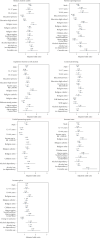Would the Brazilian population support the alcohol policies recommended by the World Health Organization?
- PMID: 35792799
- PMCID: PMC9239545
- DOI: 10.11606/s1518-8787.2022056004093
Would the Brazilian population support the alcohol policies recommended by the World Health Organization?
Abstract
Objective: To evaluate the support of the Brazilian population to the alcohol-policies proposed by the World Health Organization to decrease alcohol harm (specifically: to decrease alcohol availability and advertising, and to increase pricing). In addition, we evaluated the factors associated with being against those policies.
Methods: Data from 16,273 Brazilians, aged 12-65 years, interviewed in the 3rd Brazilian Household Survey on Substance Use (BHSU-3) were analyzed. The BHSU-3 is a nationwide, probability survey conducted in 2015. Individuals were asked if they would be against, neutral, or in favor of seven alcohol policies grouped as: 1) Strengthen restrictions on alcohol availability; 2) Enforce bans or restrictions on alcohol advertising, sponsorship, and promotion; and 3) Raise prices on alcohol through excise taxes and pricing. Generalized linear models were fitted to evaluate factors associated with being against each one of those policies and against all of policies.
Results: Overall, 28% of the Brazilians supported all the above mentioned policies, whereas 16% were against them. The highest rate of approval refers to restricting advertising (53%), the lowest refers to increasing prices (40%). Factors associated with being against all policies were: being male (AOR = 1.1; 95%CI: 1.0-1.3), not having a religion (AOR = 1.4; 95%CI: 1.1-1.8), being catholic (AOR = 1.3; 95%CI: 1.1-1.5), and alcohol dependence (AOR = 1.6; 95%CI: 1.1-2.4).
Conclusions: The Brazilian government could count on the support of most of the population to restrict alcohol advertising. This information is essential to tackle the lobby of the alcohol industry and its clever marketing strategy.
Conflict of interest statement
Conflict of Interest: The authors declare no conflict of interest.
Figures


References
-
- World Health Organization. Global status report on alcohol and health 2018. Geneva (CH); WHO; 2018 [cited 2021 Jul 23]. Available from: https://www.who.int/publications/i/item/9789241565639
-
- World Health Organization. World Health Statistics 2017: monitoring health for the SDGs, sustainable development goals. Geneva (CH): WHO; 2017 [cited 2021 Jul 23]. Available from: https://apps.who.int/iris/handle/10665/255336
-
- Institute for Health Metrics and Evaluation. Burden of Disease: country profiles-Brazil. Seattle, WA: IHME; 2017.
MeSH terms
LinkOut - more resources
Full Text Sources
Medical

